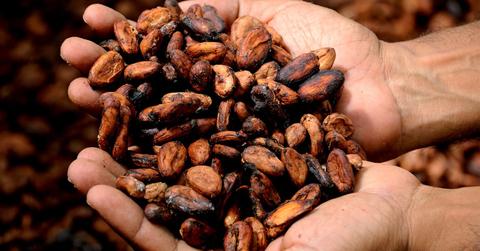Swiss Initiative Aims To Sweeten The Cocoa Industry With Sustainable Focus
A newly formed Swiss organization is pushing to make the cocoa industry more environmentally and socially responsible. First, they want to ensure that at least 80 percent of imported cocoa products in Switzerland come from sustainable production.
Updated May 24 2019, 3:31 a.m. ET
A new Swiss organization is pushing to make the cocoa industry more environmentally and socially responsible. Central to the group’s efforts is a pledge to ensure that at least 80 percent of imported cocoa products in Switzerland will come from sustainable production, the Swiss Broadcasting Corporation reports.
The Swiss Platform for Sustainable Cocoa was launched last week and announced by Chocosuisse, the State Secretariat for Economic Affairs (SECO), and nongovernmental organizations such as Swisscontact and Helvetas. Cocoa producers involved with the new program agreed to work toward 10 objectives; the central being a pledge that by 2025, at lease 80 percent of cocoa products being imported will be sustainably produced. Meeting these goals would make Switzerland’s cocoa industry a leader and pioneer in sustainable cocoa production and distribution.
Switzerland is the world’s biggest consumer of chocolate.
Switzerland has the highest per-capita consumption of chocolate worldwide, with the average Swiss resident consuming 19.8 pounds of the stuff each year. And although Switzerland isn’t the biggest producer of cocoa (that distinction goes to Côte d'Ivoire), the country is known for its beautiful, high-quality and totally delicious chocolate products.
The cocoa industry has a not-so-sweet side.
It is estimated that around 530,000 children work under abusive conditions on cocoa plantations throughout the Ivory Coast and Ghana, according to Swiss NGO Public Eye. Half of the world’s cocoa comes from these two countries; and the Ivory Coast is responsible for around 30 percent of the world’s exploited cocoa, and Ghana for 20 percent. Less than 10 percent of the costs associated with making chocolate is incurred where the cocoa is being grown, in spite of these locations being the most stressed and time-consuming parts of the production process.
In addition, recently grown cocoa beans in the Ivory Coast have been rejected for not meeting quality standards because they have too much acidity and the beans are too small. These rejections are exacerbating an already-existing shortage, leading to some industry murmurs of a serious cocoa shortage looming on the horizon.
Through the Swiss Platform for Sustainable Cocoa, Switzerland would ensure its chocolate and cocoa imports only came from reputable sources, thereby encouraging producers to adopt more sustainable, socially fair policies for production. By doing so, the group also hopes to inspire other countries to adopt similar policies to encourage cocoa producers around the world.
Cocoa communication is key.
The Swiss Platform for Sustainable Cocoa also seeks to promote dialogue between organizations in producing countries and local authorities, offering support for improving conditions on farms, for farmers, and for workers. These improvements could include healthier growing conditions, higher wages, more training, and working within natural landscapes.
To begin, the platform suggests that expert groups will need to be set up in order to address climate resilience, biodiversity, traceability of cocoa butter, and measures to reduce cocoa beans' cadmium levels. Stakeholder dialogue and international alignment are also key points, with the focus on cooperation-based initiatives that reinforce sustainability throughout the cocoa supply chain. Lastly, there is a strong emphasis on implementing knowledge and best practice guidelines, as well as monitoring and reporting on the accomplishments of their established goals.
With improved communication and pressure to grow more sustainably and provide workers with healthy conditions and reasonable pay, the global cocoa industry may be able to face the anticipated cocoa shortage in coming years head on and in a way that won’t take environmental and social tolls.
